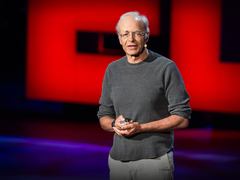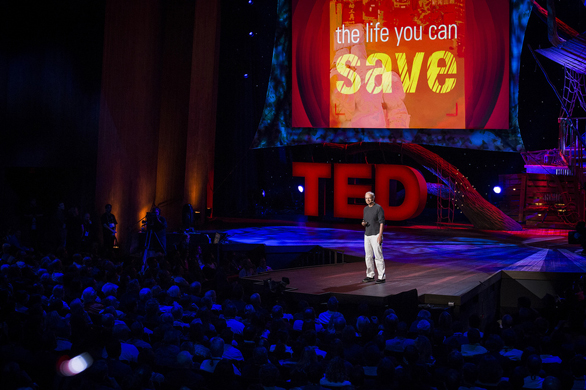Every day, most of us do something morally indefensible — we go about our lives without sending help to the 6.9 million children under the age of 5 who will die this year from poverty-related disease. In today’s talk, philosopher Peter Singer makes the case that ignoring these kids is as inhumane as ignoring a child who’s been hit by a car on the street in front of you.
 Peter Singer: The why and how of effective altruism
“Does it really matter that they’re far away?” asks Singer. “I don’t think it does make a morally relevant difference — the fact that they’re not right in front of us, or the fact that they’re of a different nationality or race.”
Peter Singer: The why and how of effective altruism
“Does it really matter that they’re far away?” asks Singer. “I don’t think it does make a morally relevant difference — the fact that they’re not right in front of us, or the fact that they’re of a different nationality or race.”
But he’s not saying this to make us feel bad and helpless. Today’s talk actually delivers good news: that through what Singer calls “effective altruism,” we all have the ability to make a difference. Effective altruism begins with reason – the realization that all lives are of equal value — and looking for charities that affect the most lives, the most effectively.
To hear how a single person — and one who is nowhere close to a billionaire – can make a big impact for good in the world, watch this talk. And below, some resources to get you thinking about giving more effectively.
Peter Singer’s top 10 recommended charities:
- Against Malaria Foundation. Of those 6.9 million children who die every year of poverty-related illness, 1 million succumb to malaria. AMF provides insecticide-treated bed nets, which only cost $5 apiece.
- Schistosomiasis Control Initiative. Protecting a child from worm-based disease for a full year costs around 50 cents. This organization works with governments to make sure it happens.
- The Humane League. Invests time, money and energy to reduce animal cruelty and save the lives of animals, focusing on farmed animals.
- GiveDirectly. This nonprofit transfers money to poor individuals in Kenya, letting them spend it for food and other basic needs, or on high-return investments.
- Oxfam International. This mega aid organization works in a wide range of areas, including disaster relief, education, sanitation and women’s rights.
- Proven Impact Fund. Dedicated to data and results, this fund from Innovations for Poverty Action supports interventions with strong evidence of success.
- The Fistula Foundation. Fistula is a ghastly injury during childbirth, and it afflicts women living in the poorest areas of the world. This organization provides needed surgery.
- The Hunger Project. Encouraging men and women to end their own hunger, this organization assists poor villages for five years, relying on the local workforce to build skills and take over before they leave.
- Vegan Outreach. A nonprofit that seeks to expose and end cruelty to animals.
- Population Services International. A global health organization that focuses on family planning, a simple service that can improve the health of women and their children.
Resources for finding other charities to support:
- GiveWell. This nonprofit does in-depth research on charities and highlights a small number that do a remarkable amount of good per dollar they receive. (Singer recommends this site.)
- Effective Animal Activism. One of the causes nearest to Singer’s heart is animal liberation, and he is impressed with this charity evaluator that focuses on animal suffering.
- Charity Navigator. The largest charity evaluator in the U.S., Charity Navigator has data and ratings for nearly 6,000 charities.
- Great Nonprofits. A site dedicated to informing would-be donors through reviews from board members, volunteers, experts and regular folks who’ve interfaced with a charity.
Resources Singer recommends for connecting with other people interested in doing good:
- Giving What We Can. The members of this international society make a bold pledge: to donate 10% of their income to eliminating poverty in the developing world. A good place to connect with others, and to find high-quality organizations to support.
- The Life You Can Save. At this site, you can pledge to donate any percentage of your income to those in need. In addition to directing you to great charities to support, it’s also a log for local volunteer opportunities.
- Effective Altruism. A blog from Peter Singer and William MacAskill dedicated to the tenets of effective altruism.
- The High Impact Network. This group has a great acronym – THINK. Members meet up to ponder effective giving — both strategically and creatively.
A resource for finding the career that does the greatest good:
- 80,000 Hours. Named after the number of hours most people will work over their lifetime, this career advice site has a twist – it gives advice on how different careers can have an impact on poverty. As Singer mentions in his talk, the site doesn’t shy away from unusual answers; it suggests that working in finance and donating a percentage of your income could fund multiple aid workers.
And further reading in effective altruism:
- The Life You Can Save: How to Do Your Part to End World Poverty. Peter Singer’s book about how each person can be a part of the solution to poverty, it calls for a cultural change to consider poverty eradication a natural part of a moral life.
- The Expanding Circle: Ethics, Evolution and Moral Progress. Peter Singer’s classic study of ethics, which examines the question: Where does our desire for altruism come from? He shows how it might come down to the biological drive to protect or kin — but that it is also a matter of reason.
- The Ethics of What We Eat: Why Our Food Choices Matter. A bold look from Peter Singer and Jim Mason on how our individual food choices affect animals, the environment and our fellow human beings.
Want more advice on how to parse the world of nonprofits and giving? Check out Dan Pallotta’s tips for picking a charity that’s right for you »

Comments (9)
Pingback: 5 Powerful Habits of Genuinely Happy People - Thrive Global
Pingback: 7 Habits of Genuinely Happy People | Fleur De Lyz
Pingback: donation time! | orange narwhals
Pingback: Science, Communication, Ethics | War and Words